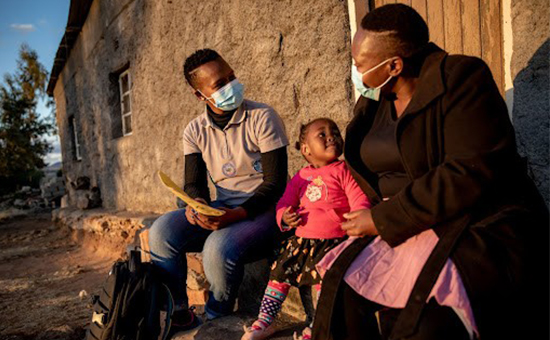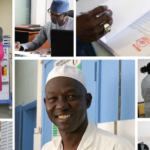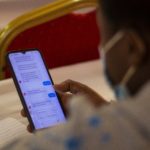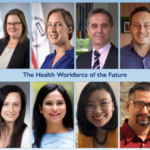02 Nov Strategic Investments in the Health Workforce: Learning from Lesotho
This blog originally appeared on USAID website.
COVID-19 highlighted the critical need for countries to make greater investments in their health workforce. This is no truer than in Lesotho, the small, mountainous country landlocked within South Africa, dealing with multiple epidemics. When COVID-19 struck, Lesotho had the second-highest number of people living with HIV per capita in the world.
The United States Agency for International Development (USAID), through the U.S. President’s Emergency Plan for AIDS Relief (PEPFAR), is a committed partner to the Government of Lesotho and continues to make significant progress towards ending preventable deaths from HIV/AIDS with a nearly 75 percent drop in AIDS deaths from the height of the HIV epidemic in Lesotho in 2005, as compared to the most recent data from 2020 (UNAIDS data 2021).
Lesotho reached a significant milestone toward ending the HIV epidemic, having met the first Joint United Nations Programme on HIV/AIDS (UNAIDS) 90-90-90 target: 90 percent of all people living with HIV know their HIV status. Lesotho also exceeded the second and third 90 targets: 90 percent of all people with diagnosed HIV infection receive sustained antiretroviral therapy, and 90 percent of all people receiving antiretroviral therapy have reached viral suppression. This progress can be traced to the direct investment made in the health workforce.
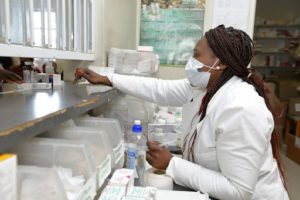
A pharmacist disbursing medicine at the Lesotho Defence Clinic (2021).
What does ‘investing in the health workforce’ mean? The most visible examples include hiring additional health workers and training the existing frontline workforce to meet urgent service demands across communities. Globally, USAID has been a key contributor to PEPFAR’s annual one billion investment in supporting additive health workers, supporting over 200,000 health workers across countries where shortfalls impede delivery of HIV services. In Lesotho, USAID alone invests over $25 million in support of an additional 4,000 health workers to advance HIV service delivery goals. “PEPFAR has been with us from day one, and we are very grateful for their support,” said Dr. Llang Maama Maime, National Tuberculosis (TB) and Leprosy Programme Manager at the Ministry of Health (MOH) in Lesotho (October 2021). “PEPFAR has helped hire and place various health workers—the triage officers, nurses, and doctors responsible for screening and treating TB and HIV in our communities, facilities, and [at] district levels.”
After COVID-19 hit, according to Dr. Maime, “We were caught off guard. But our partners stood with us, helping us buy protective clothing for our health workers, repurposing staff towards the response, and most recently, putting in place additional health workers in the National Reference Laboratory and in [hospital] intensive care units.” Through the COVID-19 pandemic, staff supported by PEPFAR are being leveraged to support urgent needs for the COVID-19 response.
Investment in the health workforce requires investment in workers themselves, as well as in the systems that are required to support an adequate and well-trained workforce. This requires building greater local health system capacity for effective, country-led health workforce planning and management to address current and emerging health demands. In many countries, the governments’ capacity to plan for and manage their health workers is inadequate, which hindered a quick response to the COVID-19 crisis and then disrupted the delivery of essential primary health care services such as HIV, as the immediate demands of the emergency were addressed.
In Lesotho, such health workforce investments are being made by PEPFAR-funded, USAID project, Human Resources in Health in 2030 Program (HRH2030) and the Meeting Targets and Maintaining Epidemic Control (EpiC) project, with targeted attention toward strengthening ministerial capacity. The Lesotho government is becoming equipped with the capabilities to address health workforce challenges and prepare and plan for a more resilient health workforce. Part of this approach has included embedding a technical advisor in the MOH to support leaders to maintain their focus on long-term health workforce planning and resiliency while they tackle the ongoing COVID-19 health emergency.
Palesa Pitso, a Senior Human Resources for Health Advisor with Open Development, and Lesotho national, serves as that embedded advisor. Open Development is a USAID partner and small, woman-owned business that partners with donors, governments, and local organizations to re-imagine how health services are financed and delivered to promote more sustainable and effective health and social systems. Her work happens behind the scenes–supporting the MOH leadership to convene stakeholders around human resources for health (HRH) planning and advising public servants as they implement the government’s priorities within the bureaucracy.
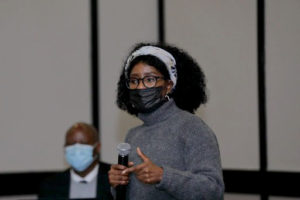
Ms. Pitso, Senior Human Resources for Health Advisor, speaking at the multisectoral Human Resources for Health Technical Working Group (TWG).
With technical support from Ms. Pitso, the Ministry has brought together disparate stakeholders into a technical working group, which is now driving the broader health workforce agenda setting in Lesotho, including sustainability planning for maintaining gains made in controlling the HIV epidemic. The working group has helped to spur political will to invest greater national resources in its health workforce and advance policies and systems that will enhance the country’s health and response to future emergencies. According to Ms. Mathapelo Mothebe, MOH Human Resources Manager, “I didn’t understand the importance of convening a technical working group until she helped us establish one. We discuss so many important things and work with many professionals easily.”
For example, to address the challenge of differing access to health care between urban and rural areas due to an inequitable distribution of health workers, Ms. Pitso assisted the MOH and the technical working group to develop an HRH deployment policy that will guide the country in selecting and deploying health workers to meet the health needs of all segments of the population, regardless of location. She also assisted the Ministry to conduct a health labor market analysis, with support from the World Health Organization, to scale up health workforce production and improve wages and working conditions of health workers. With her assistance, the MOH developed the HRH Strategic Plan (2020-2030) to optimize the performance, quality, and impact of the existing workforce to manage emergencies and broader health needs. The HRH strategic document outlines the country’s plans for strengthening the production and development of health workers; enhancing their recruitment, management, and retention; and mobilizing funds to continue strengthening HRH policy and strategy efforts.
The placement of embedded advisors like Ms. Pitso can act as a critical lever in helping to strengthen a country’s own leadership as they build their capacity in HRH to transition to a more sustainable workforce. “I am new here and there are so many moving parts, all moving at the same time, and requiring one’s attention,” said Mr. Lehlohonolo Ndumo, Human Resources Director at the MOH. “When I joined the Ministry [of Health], Ms. Pitso prepared me to lead policy dialogue on HRH issues in Lesotho based on the recent health labor market analysis conducted. I felt confident leading that dialogue with her by my side.”
The COVID-19 pandemic has underscored the importance of investment in the health workforce. This is a critical area of focus as the global HIV community pivots toward sustaining gains made in achieving UNAIDS 90-90-90 targets in countries like Lesotho. This entails building stronger local health system capacity to manage and provide adequate support and protection for the number of health workers required to meet service demands. The work in Lesotho also highlights a model of technical support, that better leverages local expertise, for a stronger country-owned and led response that secures a robust health workforce equipped to respond to the needs of today and the future.
Photo: Limpho Nteko of mothers2mothers (m2m) visits a client at home in Mafeteng District, Lesotho, to ensure families receive vital health education and services, even during COVID-19. (2021) All photos courtesy of Open Development.






